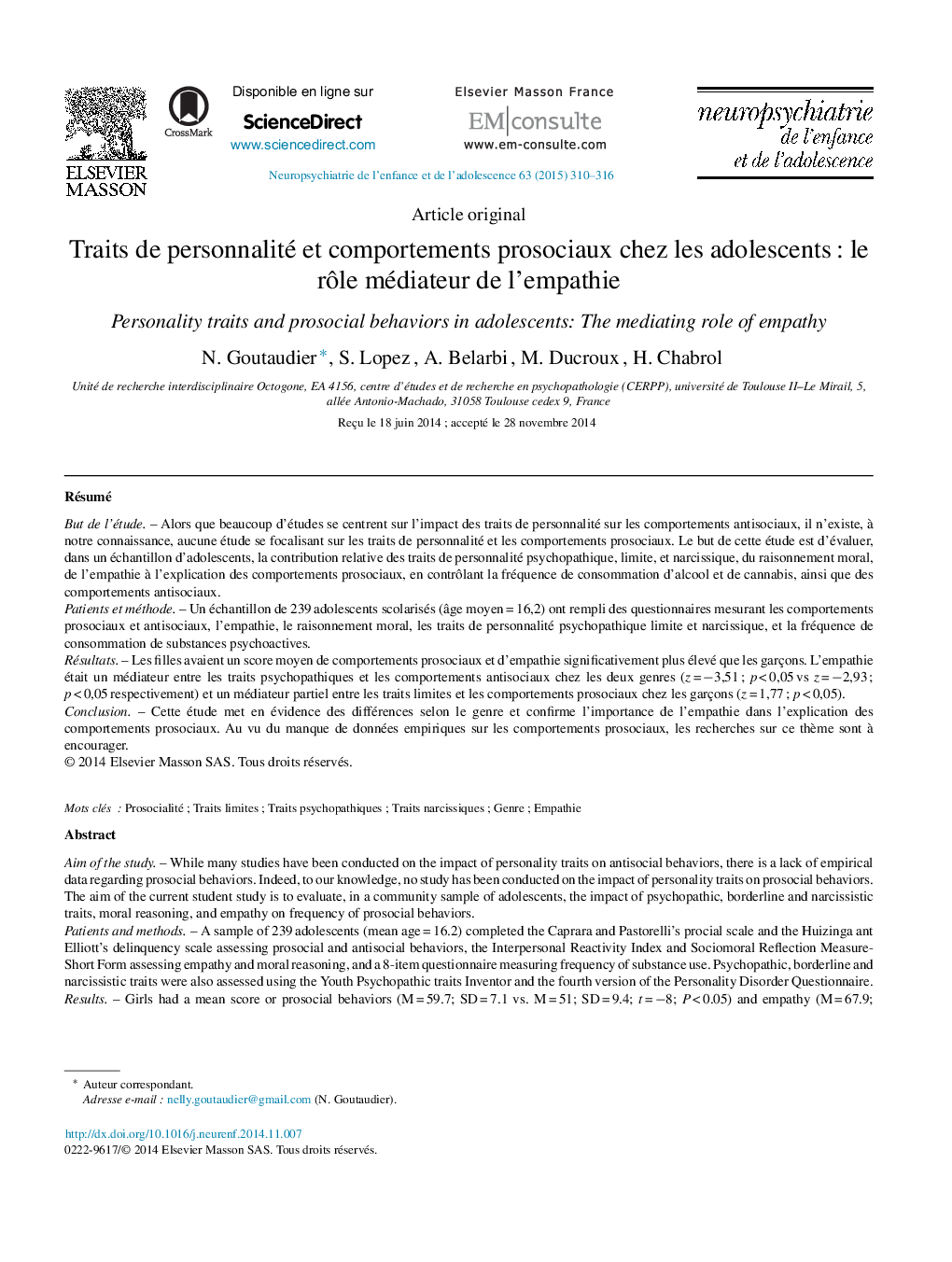| کد مقاله | کد نشریه | سال انتشار | مقاله انگلیسی | نسخه تمام متن |
|---|---|---|---|---|
| 943738 | 925555 | 2015 | 7 صفحه PDF | دانلود رایگان |

RésuméBut de l’étudeAlors que beaucoup d’études se centrent sur l’impact des traits de personnalité sur les comportements antisociaux, il n’existe, à notre connaissance, aucune étude se focalisant sur les traits de personnalité et les comportements prosociaux. Le but de cette étude est d’évaluer, dans un échantillon d’adolescents, la contribution relative des traits de personnalité psychopathique, limite, et narcissique, du raisonnement moral, de l’empathie à l’explication des comportements prosociaux, en contrôlant la fréquence de consommation d’alcool et de cannabis, ainsi que des comportements antisociaux.Patients et méthodeUn échantillon de 239 adolescents scolarisés (âge moyen = 16,2) ont rempli des questionnaires mesurant les comportements prosociaux et antisociaux, l’empathie, le raisonnement moral, les traits de personnalité psychopathique limite et narcissique, et la fréquence de consommation de substances psychoactives.RésultatsLes filles avaient un score moyen de comportements prosociaux et d’empathie significativement plus élevé que les garçons. L’empathie était un médiateur entre les traits psychopathiques et les comportements antisociaux chez les deux genres (z = −3,51 ; p < 0,05 vs z = −2,93 ; p < 0,05 respectivement) et un médiateur partiel entre les traits limites et les comportements prosociaux chez les garçons (z = 1,77 ; p < 0,05).ConclusionCette étude met en évidence des différences selon le genre et confirme l’importance de l’empathie dans l’explication des comportements prosociaux. Au vu du manque de données empiriques sur les comportements prosociaux, les recherches sur ce thème sont à encourager.
Aim of the studyWhile many studies have been conducted on the impact of personality traits on antisocial behaviors, there is a lack of empirical data regarding prosocial behaviors. Indeed, to our knowledge, no study has been conducted on the impact of personality traits on prosocial behaviors. The aim of the current student study is to evaluate, in a community sample of adolescents, the impact of psychopathic, borderline and narcissistic traits, moral reasoning, and empathy on frequency of prosocial behaviors.Patients and methodsA sample of 239 adolescents (mean age = 16.2) completed the Caprara and Pastorelli's procial scale and the Huizinga ant Elliott's delinquency scale assessing prosocial and antisocial behaviors, the Interpersonal Reactivity Index and Sociomoral Reflection Measure-Short Form assessing empathy and moral reasoning, and a 8-item questionnaire measuring frequency of substance use. Psychopathic, borderline and narcissistic traits were also assessed using the Youth Psychopathic traits Inventor and the fourth version of the Personality Disorder Questionnaire.ResultsGirls had a mean score or prosocial behaviors (M = 59.7; SD = 7.1 vs. M = 51; SD = 9.4; t = −8; P < 0.05) and empathy (M = 67.9; SD = 12.5 vs. M = 53.3; SD = 12.9; t = −8.4; P < 0.05) significantly higher than boys. A two step regression analysis was conducted using frequency of prosocial behaviors as a dependant variable. Results evidenced that empathy was positively associated with frequency of prosocial behaviors in both gender. As gender was highlighted as a significant independent predictor and empathy as a potential mediator, additional mediation analyses were conducted in both gender. Empathy was a mediator between psychopathic traits and antisocial behaviors in both gender (z = −3.51; P < 0.05 vs. z = −2.93; P < 0.05) and a partial mediator between borderline traits and prosocial behaviors in boys (z = 1.77; P < 0.05).ConclusionOur findings highlighted gender differences and confirm the importance of empathy in the explanation of prosocial behaviors. Interestingly, a negative but not significant association was found between prosocial and antisocial behaviors, highlighting that a slightly association between both constructs. While borderline traits have been reported to be associated with empathy disorders, low borderline traits might increase prosocial and empathic responses in adolescents. Given the lack of empirical data on prosocial behaviors, further studies in this area are warranted.
Journal: Neuropsychiatrie de l'Enfance et de l'Adolescence - Volume 63, Issue 5, August 2015, Pages 310–316